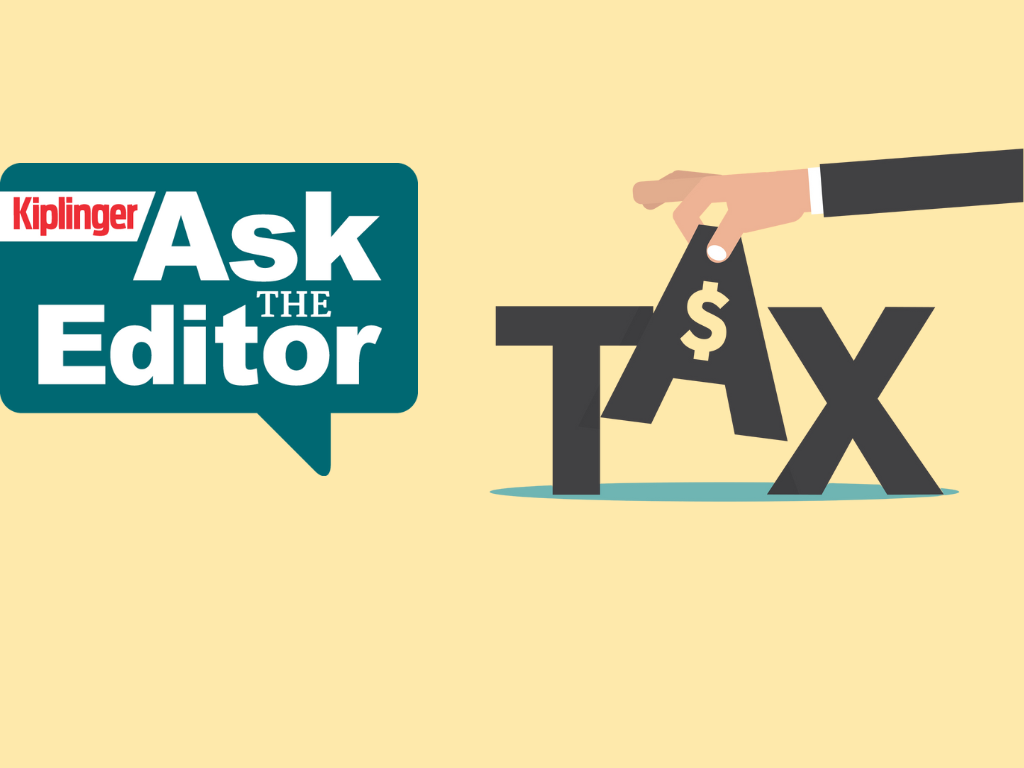Ask the Editor, October 3: Tax Questions on the Charitable Deduction
In our Ask the Editor round-up, Joy Taylor, The Kiplinger Tax Letter Editor, answers questions on the tax rules for charitable deductions.

Profit and prosper with the best of Kiplinger's advice on investing, taxes, retirement, personal finance and much more. Delivered daily. Enter your email in the box and click Sign Me Up.
You are now subscribed
Your newsletter sign-up was successful
Want to add more newsletters?

Delivered daily
Kiplinger Today
Profit and prosper with the best of Kiplinger's advice on investing, taxes, retirement, personal finance and much more delivered daily. Smart money moves start here.

Sent five days a week
Kiplinger A Step Ahead
Get practical help to make better financial decisions in your everyday life, from spending to savings on top deals.

Delivered daily
Kiplinger Closing Bell
Get today's biggest financial and investing headlines delivered to your inbox every day the U.S. stock market is open.

Sent twice a week
Kiplinger Adviser Intel
Financial pros across the country share best practices and fresh tactics to preserve and grow your wealth.

Delivered weekly
Kiplinger Tax Tips
Trim your federal and state tax bills with practical tax-planning and tax-cutting strategies.

Sent twice a week
Kiplinger Retirement Tips
Your twice-a-week guide to planning and enjoying a financially secure and richly rewarding retirement

Sent bimonthly.
Kiplinger Adviser Angle
Insights for advisers, wealth managers and other financial professionals.

Sent twice a week
Kiplinger Investing Weekly
Your twice-a-week roundup of promising stocks, funds, companies and industries you should consider, ones you should avoid, and why.

Sent weekly for six weeks
Kiplinger Invest for Retirement
Your step-by-step six-part series on how to invest for retirement, from devising a successful strategy to exactly which investments to choose.
Each week, in our Ask the Editor series, Joy Taylor, The Kiplinger Tax Letter Editor, answers questions on topics submitted by readers. This week, she’s looking at questions on the tax rules for charitable deductions. (Get a free issue of The Kiplinger Tax Letter or subscribe.)
1. How do I substantiate my write-off?
Question: I donated money to charity earlier this year, and I would like to deduct the contribution on my tax return since I will be itemizing on Schedule A of Form 1040. What documents do I need to keep to support the tax write-off?
Joy Taylor: The required documentation for substantiating a charitable contribution write-off differs based on whether you are donating property or cash and the amount of the donation. I've set forth some of the rules here. For charitable gifts of cash:
From just $107.88 $24.99 for Kiplinger Personal Finance
Become a smarter, better informed investor. Subscribe from just $107.88 $24.99, plus get up to 4 Special Issues

Sign up for Kiplinger’s Free Newsletters
Profit and prosper with the best of expert advice on investing, taxes, retirement, personal finance and more - straight to your e-mail.
Profit and prosper with the best of expert advice - straight to your e-mail.
- Keep cancelled checks, electronic fund transfer receipts, credit card statements or a letter from the charity
- For cash donations of $250 or more, receipt of a contemporaneous written acknowledgment from the charity is required
For charitable gifts of property:
- A letter or receipt from the charity suffices for property donations under $250
- For property donations of $250 or more, receipt of a contemporaneous written acknowledgment from the charity is required
- Attach Form 8283 to your tax return if your property donation exceeds $500
- Obtain a written appraisal for a donation of property over $5,000
You can find more information on the substantiation rules for charitable donations in IRS Publication 526, Charitable Contributions.
2. Will the IRS audit me?
Question: I am planning on making a big donation to charity closer to year-end. Will my IRS audit odds go up because of the large charitable contribution deduction I claim on Schedule A of my 1040?
Joy Taylor: It depends. You won’t automatically be audited by the IRS for claiming big deductions on your tax return. But if your write-offs are disproportionately large when compared with the income reported on your return, your risk of an audit rises because that is a key factor in the IRS’s process of selecting returns for examination. Make sure to keep good records and to comply with the substantiation rules for charitable contributions, which you can find in IRS Publication 526 (as above).
3. What if I donate an annuity contract?
Question: I am thinking of donating an annuity contract I own to charity. Can you explain the tax consequences if I decide to do this?
Joy Taylor: You will generally be treated as receiving taxable income equal to the difference between the annuity’s cash surrender value and your investment in the contract. For example, say you have a small variable annuity in which you invested $20,000 years ago, and it’s now worth $43,000. If you donate it to charity, you’ll have to report $23,000 of the appreciation as additional income on your tax return in the year of the transfer. You will also be able to take a charitable deduction on Schedule A of Form 1040. The charitable write-off will equal the value of the annuity in most cases.
4. Any changes for next year?
Question: I heard that the “One Big Beautiful Bill” (OBBB) allows nonitemizers to deduct charitable contributions. When does this take effect?
Joy Taylor: The OBBB has mixed news for individuals who make charitable donations. Two new rules begin in 2026, meaning they will first affect your 2026 tax return that you file in 2027. First, the good news. Nonitemizers will be able to deduct up to $1,000 of their charitable cash contributions. The amount is $2,000 for joint filers.
Now, the bad news. Charitable donations claimed by itemizers on Schedule A will be subject to a haircut. Beginning with 2026 returns, the charitable write-off is deductible only to the extent that total charitable gifts exceed 0.5% of adjusted gross income. For example, say your AGI is $232,000 and you donate $14,000 to charity in 2026. If you itemize on Schedule A, you can only deduct $12,840 of charitable contributions ($14,000 – ($232,000 x 0.005)).
5. Will I owe tax if I donate I bonds?
Question: I own Series I savings bonds that have not yet matured. Can I donate the I bonds to charity before they mature and avoid a federal income tax hit?
Joy Taylor: No. Series I (and EE) bond buyers have a choice when they acquire the bonds. They can pay federal income tax each year on the interest earned or defer the tax bill to the end. Most people choose the latter. They report the interest income on their Form 1040 for the year the bonds mature (generally 30 years) or when they’re cashed in, whichever comes first.
I assume you have deferred reporting for federal income tax purposes the annual interest that you earned on the savings bonds. Gifting away EE or I bonds to someone else, including a charitable organization, before those bonds mature, doesn’t let you avoid the tax on previously untaxed interest. Instead, it will accelerate interest reporting. You will owe federal income tax on all the previously deferred interest in the year you make the donation.
About Ask the Editor, Tax Edition
Subscribers of The Kiplinger Tax Letter, The Kiplinger Letter and The Kiplinger Retirement Report can ask Joy questions about tax topics. You'll find full details of how to submit questions in each publication.
Subscribe to The Kiplinger Tax Letter, The Kiplinger Letter or The Kiplinger Retirement Report.
We have already received many questions from readers on topics related to tax changes in the OBBB and more. We will continue to answer these in future Ask the Editor round-ups. So keep those questions coming!
Not all questions submitted will be published, and some may be condensed and/or combined with other similar questions and answers, as required editorially. The answers provided by our editors and experts, in this Q&A series, are for general informational purposes only. While we take reasonable precautions to ensure we provide accurate answers to your questions, this information does not and is not intended to, constitute independent financial, legal, or tax advice. You should not act, or refrain from acting, based on any information provided in this feature. You should consult with a financial or tax advisor regarding any questions you may have in relation to the matters discussed in this article.
More Reader Questions Answered
- All Ask the Editor Q&As
- Ask the Editor: Reader Questions on QCDs
- Ask the Editor: Tax Questions on The SALT Deduction
- Ask the Editor: Questions on Four New Tax Deductions
- Ask the Editor: Questions on Inherited IRAs
- Ask the Editor: Questions on Home Sales and Taxes
Profit and prosper with the best of Kiplinger's advice on investing, taxes, retirement, personal finance and much more. Delivered daily. Enter your email in the box and click Sign Me Up.

Joy is an experienced CPA and tax attorney with an L.L.M. in Taxation from New York University School of Law. After many years working for big law and accounting firms, Joy saw the light and now puts her education, legal experience and in-depth knowledge of federal tax law to use writing for Kiplinger. She writes and edits The Kiplinger Tax Letter and contributes federal tax and retirement stories to kiplinger.com and Kiplinger’s Retirement Report. Her articles have been picked up by the Washington Post and other media outlets. Joy has also appeared as a tax expert in newspapers, on television and on radio discussing federal tax developments.
-
 Quiz: Do You Know How to Avoid the "Medigap Trap?"
Quiz: Do You Know How to Avoid the "Medigap Trap?"Quiz Test your basic knowledge of the "Medigap Trap" in our quick quiz.
-
 5 Top Tax-Efficient Mutual Funds for Smarter Investing
5 Top Tax-Efficient Mutual Funds for Smarter InvestingMutual funds are many things, but "tax-friendly" usually isn't one of them. These are the exceptions.
-
 AI Sparks Existential Crisis for Software Stocks
AI Sparks Existential Crisis for Software StocksThe Kiplinger Letter Fears that SaaS subscription software could be rendered obsolete by artificial intelligence make investors jittery.
-
 Ask the Editor, February 13: More Questions on IRAs
Ask the Editor, February 13: More Questions on IRAsAsk the Editor In this week's Ask the Editor Q&A, Joy Taylor answers questions on IRAs
-
 Big Change Coming to the Federal Reserve
Big Change Coming to the Federal ReserveThe Lette A new chairman of the Federal Reserve has been named. What will this mean for the economy?
-
 Ask the Editor, February 6: Questions on Federal Income Tax Deductions
Ask the Editor, February 6: Questions on Federal Income Tax DeductionsAsk the Editor In this week's Ask the Editor Q&A, Joy Taylor answers questions on federal income tax deductions
-
 Ask the Editor, January 30: Questions on Social Security Benefits Taxation
Ask the Editor, January 30: Questions on Social Security Benefits TaxationAsk the Editor In this week's Ask the Editor Q&A, Joy Taylor answers questions on the taxation of Social Security benefits
-
 Ask the Tax Editor, January 23: Questions on Residential Rental Property
Ask the Tax Editor, January 23: Questions on Residential Rental PropertyAsk the Editor In this week's Ask the Editor Q&A, Joy Taylor answers questions on reporting income and loss from residential rental property.
-
 Ask the Editor, January 16: Tips for Filing Your Form 1040
Ask the Editor, January 16: Tips for Filing Your Form 1040Ask the Editor In this week's Ask the Editor Q&A, Joy Taylor answers questions on preparing and filing your 2025 Form 1040.
-
 Ask the Editor, January 9: How to Get Ready for Tax Filing Season
Ask the Editor, January 9: How to Get Ready for Tax Filing SeasonAsk the Editor In this week's Ask the Editor Q&A, Joy Taylor answers questions on the IRS tax filing season and your 2025 tax return
-
 Ask the Editor, December 19: Itemized Deductions
Ask the Editor, December 19: Itemized DeductionsAsk the Editor In this week's Ask the Editor Q&A, Joy Taylor answers questions on itemized deductions claimed on Schedule A of Form 1040